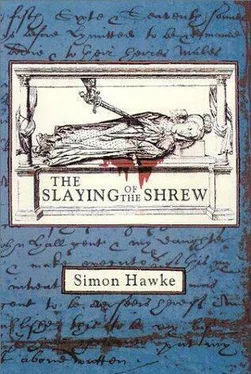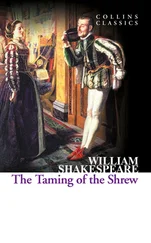Simon Hawke - The Slaying Of The Shrew
Здесь есть возможность читать онлайн «Simon Hawke - The Slaying Of The Shrew» весь текст электронной книги совершенно бесплатно (целиком полную версию без сокращений). В некоторых случаях можно слушать аудио, скачать через торрент в формате fb2 и присутствует краткое содержание. Жанр: Исторический детектив, на английском языке. Описание произведения, (предисловие) а так же отзывы посетителей доступны на портале библиотеки ЛибКат.
- Название:The Slaying Of The Shrew
- Автор:
- Жанр:
- Год:неизвестен
- ISBN:нет данных
- Рейтинг книги:5 / 5. Голосов: 1
-
Избранное:Добавить в избранное
- Отзывы:
-
Ваша оценка:
- 100
- 1
- 2
- 3
- 4
- 5
The Slaying Of The Shrew: краткое содержание, описание и аннотация
Предлагаем к чтению аннотацию, описание, краткое содержание или предисловие (зависит от того, что написал сам автор книги «The Slaying Of The Shrew»). Если вы не нашли необходимую информацию о книге — напишите в комментариях, мы постараемся отыскать её.
The Slaying Of The Shrew — читать онлайн бесплатно полную книгу (весь текст) целиком
Ниже представлен текст книги, разбитый по страницам. Система сохранения места последней прочитанной страницы, позволяет с удобством читать онлайн бесплатно книгу «The Slaying Of The Shrew», без необходимости каждый раз заново искать на чём Вы остановились. Поставьте закладку, и сможете в любой момент перейти на страницу, на которой закончили чтение.
Интервал:
Закладка:
“We are bloodthirsty creatures, Tuck,” he said, as they walked down the great hall of the mansion, past portraits of Godfrey Middleton’s ancestors and illustrious figures from England ’s history, including, of course, the queen. It would not do at all for her to visit at some point and not see a portrait of herself in a place of honor in the great hall. “We think of ourselves as being a civilized people, and yet, in truth, we are still little more than savages. We all flock to a good hanging or a drawing and quartering, and the more the unfortunate victim screams and blubbers, the more we seem to like it.”
“I thought you said before that such sights were meant to horrify and caution us,” Smythe replied.
“Oh, indeed they are,” said Shakespeare. “But even so, there is some savage part of us that hearkens back to those ancient times when we painted our bums blue and smashed one another’s heads in with stone axes, and ‘tis that part which finds the horror curiously stimulating. We discover that it thrills the blood and invigorates the humors. If we should see a carriage wrecked up by the roadside as we ride by, what do we do? Why, we slow down to a walk, thus the better to observe the carnage. And if we happen by when two men are fighting in the street, pummeling each other into bloody pulp, why then we stop and watch, we pick a favorite and cheer him on, perhaps even lay wagers. Our own mortality is sport to us and we play it with a vengeance. Thus, the ground upon which a murder victim falls becomes a sort of playing field.”
“I must say, you see things in a curious way sometimes,” said Smythe, looking around the long hall as they went.
“ ‘Tis because I observe people,” replied Shakespeare, “and people are often very curious.”
As they walked, Smythe noticed their surroundings. They had the great hall almost entirely to themselves. There were a few guests promenading up and down, talking amongst themselves, and every few moments a servant would hustle by with an annoyed expression, because of the lateness of the hour. Night had turned into day at the Middleton estate, and while some of the guests were sleeping, most were still up, though by now they had moved out to the torch-lit fairgrounds to gather round the stalls or at the campfires and discuss the day’s events. The festival had taken a dark turn and no one wanted to miss out on hearing any gossip or miss seeing anything else that might occur.
Smythe had not been to many rich people’s homes. This was only the second one he’d seen. He had been honored to have been invited to Sir William’s handsome and sprawling estate, Green Oaks, on several occasions and he could tell that Godfrey Middleton had taken pains to see that Middleton Manor did not suffer greatly by comparison.
As at Green Oaks, the great hall of Middleton Manor was built with a long gallery, and the walls were panelled with imported woods. The ceilings were an intricate pattern of shallow plaster ribs in geometrical forms, ornamented with arabesques and figures of birds and fishes and beasts, as well as flowers and scrollworks of vines. The staircases were ornate, with solid oak block steps and landings with massive hand rails and newel posts that were all elaborately carved and ornamented with small statues. No expense was spared anywhere in the construction of this house.
Likewise, the decorations in the hall were all expensive and ornate. Several gleaming and enamelled suits of armor stood about, every one of them apparently brand new and doubtless never worn, and there were various weapons hanging on the walls in display arrangements, among them broadswords, rapiers, maces and halbreds, battle axes and, Smythe especially noted, several crossbows with pouches full of bolts.
There were large, richly woven tapestries, with not a painted cloth among them, and of course, large, gilt-framed ancestral portraits and paintings of historical personages. It was these which had caught Smythe’s eye as they walked. There was something curious about them, somehow, something which had troubled him vaguely, and for a while he could not quite put his finger on it, but abruptly, it occurred to him exactly what it was.
“Speaking of observing people, have you noticed anything strange about these portraits?” Smythe asked.
“Strange?” Shakespeare frowned. He had not been paying attention to them. “The portraits? How so?”
“Well… have you not noticed that there are no signs of age on any of them?” Smythe paused and approached one of the paintings, examining it more closely. He stretched out a finger and gently touched the canvas. “The canvas is still quite taut, stretched tight as a drum, and the colors are all so fresh and vivid, they look as if they have scarcely had the time to dry. Most of these portraits have only been painted fairly recently, unless I miss my guess.”
Shakespeare shrugged. “And so what of it? The house is still relatively new, is it not? ‘Tis no more than a few years old. So Middleton had commissioned a few score portraits to hang upon his walls. I suppose he could have purchased older paintings, but then why not commission new ones? After all, he can certainly afford them.”
“Oh, I do not dispute that,” Smythe replied. “ ‘Twas not my point, Will. Middleton is very rich, I grant you that. ‘Tis just that I was thinking… if most of these paintings are supposed to be portraits of his ancestors, then do you not find it curious that they were only painted recently?”
“Perhaps he merely had some older portraits copied,” Shakespeare said.
“But why would anyone do that?” persisted Smythe. “A portrait of an ancestor becomes more valued and more meaningful with age. It conveys a sense of history, of lineage. Making copies of old portraits so that new ones could be hung would be rather like opening a cask of fine, aged wine and spilling it all out, only to refill it with juice from newly ripened grapes. It simply makes no sense.”
“No… I suppose not,” said Shakespeare, with a puzzled look. “I had not considered it that way. In truth, I had not considered it at all. I was, in fact, considering the murders that took place at this house, not the paintings that are hung within it.”
“Well, I am not sure why it struck my notice, only that it did,” said Smythe. “Does it not make you wonder how genuine the likenesses may be?”
“What are you going on about?” asked Shakespeare, frowning. “We have two murders we must solve! What is all this about the blasted paintings? What have they to do with anything?”
“I am not certain,” Smythe replied. “Perhaps nothing at all.” He shook his head. “I cannot say why I notice such things, only that I do, you see. You observe people closely, I suppose because you write about them and thus need to understand them better. I simply observe things, perhaps because I have been taught to make them well. I notice if a sword is crafted well or if ‘tis simply flashy, ornamented to no purpose save to disguise the fact that the blade is not made very well. The blade the Frenchman carries, for example, seems to be a fairly good one from what little I could see of it, and young Holland carried a simple, albeit first-class duelist’s rapier. What was more, he knew how to use it. If we were to make inquiries, I would wager we would find that he had studied with a fencing master.”
“Well, whoever killed him must have studied harder,” Shakespeare said, wryly.
“Precisely,” Smythe replied. “You may jest, but I could tell from the cadence of the strokes that both combatants knew what they were about. That it went so quickly also tells me that the killer was either very lucky or else he was a first-rate swordsman. Holland had skill, yet despite that, he never stood a chance. For my money, our man is the very devil with a blade.”
Читать дальшеИнтервал:
Закладка:
Похожие книги на «The Slaying Of The Shrew»
Представляем Вашему вниманию похожие книги на «The Slaying Of The Shrew» списком для выбора. Мы отобрали схожую по названию и смыслу литературу в надежде предоставить читателям больше вариантов отыскать новые, интересные, ещё непрочитанные произведения.
Обсуждение, отзывы о книге «The Slaying Of The Shrew» и просто собственные мнения читателей. Оставьте ваши комментарии, напишите, что Вы думаете о произведении, его смысле или главных героях. Укажите что конкретно понравилось, а что нет, и почему Вы так считаете.












